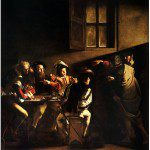It is the most simple yet the most complex event in history. It started when God created man. God loved (and loves) man infinitely and imbued him with ineradicable dignity. Standards would be set and laws made that would structure and serve to guarantee the integrity of God’s most extraordinary creation. But, alas, man sinned and soiled his relationship with God and would never be able to achieve reconciliation with his Creator through his own means. As such, God would do the unthinkable. Rather than casting his beloved creation aside as a frustrating and failed experiment, He would become Man (yet fully remain Divine). By His words and action, He would teach us how to truly live. And since a perfect God must serve perfect Justice and perfect Mercy, He would suffer a most grievous and humiliating death in the name of paying debts that we would never be able to pay. Consequently, our greatest responsibility is to accept His incomparable gift of serving as our “stand in”, our “surrogate”, our “scapegoat” for the damnation we deserve. Tonight, on the Eve of the most consequential event in history, we dream of the entry of God into Human History…as a baby. The Invulnerable becomes the Vulnerable. The Creator entrusts Himself to His Creation. And we are forever changed because of it.
While this stunning reality is apparent in the Story of Christmas, we have, in many ways, become numb to it. Having heard the story so often, having lives that are hassled and hurried, having a touch of cynicism and skepticism, we miss the wonder of this matchless Event. At times we consider ourselves too advanced, too modern, and too busy to be truly awed by this quaint little tale. Surely, we are too wise for this sort of thing, aren’t we? Is it possible that the Gospel’s Three Wise Men felt the same? This is where G.K. Chesterton’s poem, The Wise Men, serves as a useful reminder.
The Wise Men
————————-Step softly, under snow or rain,
To find the place where men can pray;
The way is all so very plain
That we may lose the way.
Oh, we have learnt to peer and pore
On tortured puzzles from our youth,
We know all labyrinthine lore,
We are the three wise men of yore,
And we know all things but the truth.
We have gone round and round the hill
And lost the wood among the trees,
And learnt long names for every ill,
And served the mad gods, naming still
The furies the Eumenides.
The gods of violence took the veil
Of vision and philosophy
The Serpent that brought all men bale,
He bites his own accursed tail,
And calls himself Eternity.
Go humbly…it has hailed and snowed…
With voices low and lanterns lit;
So very simple is the road,
That we may stray from it.
The wold grows terrible and white,
And blinding white the breaking day;
We walk bewildered in the light,
For something is too large for sight,
And something much too plain to say.
The Child that was ere worlds begun
(…We need but walk a little way,
We need but see a latch undone…)
The Child that played with moon and sun
Is playing with a little hay.
The house from which the heavens are fed,
The old strange house that is our own,
Where trick of words are never said,
And Mercy is as plain as bread,
And Honour is as hard as stone.
Go humbly, humble are the skies,
And low and large and fierce the Star;
So very near the Manger lies
That we may travel far.
Hark! Laughter like a lion wakes
To roar to the resounding plain.
And the whole heaven shouts and shakes,
For God Himself is born again,
And we are little children walking
Through the snow and rain.
It is the paradox of Christianity that the wise are made to feel foolish. Children understand, but adults are confused. Just when we arrogantly dismiss something, we miss it. Just as we egotistically grasp something, we grasp the wrong thing. We are so wise, but truly we are so damned foolish. As Chesterton reminds us, not only about the three wise men, but about ourselves,
The way is all so very plain
That we may lose the way.&
We know all things but the truth
&
We walk bewildered in the light,
For something is too large for sight,
And something much too plain to say.
When Chesterton converted to Catholicism, he described the laughable wisdom of man he was happily leaving to embrace the Wisdom of God,
The sages have a hundred maps to giveThat trace their crawling cosmos like a tree,They rattle reason out through many a sieveThat stores the sand and lets the gold go free












